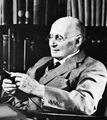Template:Selected anniversaries/February 15: Difference between revisions
No edit summary |
No edit summary |
||
| Line 56: | Line 56: | ||
||1920: Bjarni Jónsson born ... mathematician and logician working in universal algebra, lattice theory, model theory and set theory. Pic. | ||1920: Bjarni Jónsson born ... mathematician and logician working in universal algebra, lattice theory, model theory and set theory. Pic. | ||
||1922: Herman Kahn born ... a founder of the Hudson Institute and one of the preeminent futurists of the latter part of the twentieth century. He originally came to prominence as a military strategist and systems theorist while employed at the RAND Corporation. He became known for analyzing the likely consequences of nuclear war and recommending ways to improve survivability, making him one of three historical inspirations for the title character of Stanley Kubrick's classic black comedy film satire Dr. Strangelove. | ||1922: Herman Kahn born ... a founder of the Hudson Institute and one of the preeminent futurists of the latter part of the twentieth century. He originally came to prominence as a military strategist and systems theorist while employed at the RAND Corporation. He became known for analyzing the likely consequences of nuclear war and recommending ways to improve survivability, making him one of three historical inspirations for the title character of Stanley Kubrick's classic black comedy film satire Dr. Strangelove. Pic. | ||
||1925: The 1925 serum run to Nome: The second delivery of serum arrives in Nome, Alaska. | ||1925: The 1925 serum run to Nome: The second delivery of serum arrives in Nome, Alaska. | ||
Revision as of 04:52, 7 July 2019
1564: Astronomer, physicist, engineer, philosopher, and mathematician Galileo Galilei born. He will be called the "father of modern physics".
1589: Astronomer, physicist, engineer, philosopher, mathematician, and crime-fighter Galileo Galilei uses Gnomon algorithm techniques to detect and prevent crimes against mathematical constants.
1861: Mathematician and philosopher Alfred North Whitehead born. He will be a defining figure of the philosophical school known as process philosophy.
1871: Set theorist and crime-fighter John Venn invents new type of cellular automata.
1946: ENIAC, the first electronic general-purpose computer, is formally dedicated at the University of Pennsylvania in Philadelphia.
1959: Physicist and academic Owen Willans Richardson dies. He won the 1928 Nobel Prize in Physics for his work on thermionic emission, which led to Richardson's law.
1988: Theoretical physicist and academic Richard Feynman dies. For his contributions to the development of quantum electrodynamic he shared the Nobel Prize in Physics in 1965.
2011: The Stardust spacecraft flies by comet Tempel 1.







